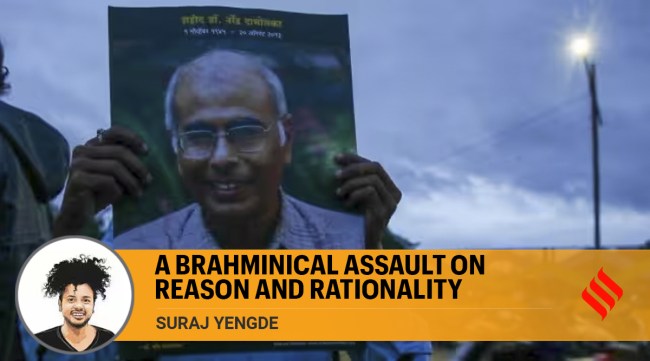Opinion A Brahminical assault on reason and rationality
The murder of leaders like Dr Narendra Dabholkar, Prof M M Kalburgi and Govind Pansare, who guided an agenda of public good and promoted constitutional values says a lot about the direction the country is heading.
 ANIS founder Narendra Dabholkar's murder has ignited many youths to turn toward rebellious truth. (Express file photo)
ANIS founder Narendra Dabholkar's murder has ignited many youths to turn toward rebellious truth. (Express file photo) Rationalist thought has roots in our land. Whosoever is tilted towards science and knowledge starts to challenge the settled notions. Once this becomes a mass movement, it creates a bigger challenge to the ones who want to keep the masses gullible and under the influence of spiritual substance.
In Maharashtra, an activist group Andhashraddha Nirmulan Samiti (ANIS) shot to fame debunking the mythology around babas, tantriks, ascetics, and pseudo-religious institutions. The sensible people of Maharashtra knew that these religious practitioners were conning the poor and illiterate, at times literate but uneducated people. Thus, they filed behind ANIS and supported it.
Dr Narendra Dabholkar, a physician and an international kabaddi player, was taking the masses towards the direction of rational thought. He formed ANIS to provide confidence to those who were tired of ritualistic madness surrounding religion and faith. The faith of the poor is to find an easy and nearest escape. This was exploited by the religious elites who fooled the masses to profit out of them.
Offering momentary psychological comfort by telling stories and rousing their senses, the general public is manipulated. People eventually depend on the person or institution that has offered them psychological support. However, this doesn’t last, and they are in duress even further, blaming the vulnerability on their own actions. To remove them from this mental torture, Dabholkar came with a gentle hand to provide support and remove people from the clutches of blind belief.
He started ANIS to spread rationality and science. Like the great rationalists of India, Phule and Periyar, the ANIS group would offer cash prizes to prove the existence of spirits. However, Phule and Periyar broke the idols of those gods whose existence was a folly and it fooled the masses. This was a direct semiotic response to the oppression of the priestly aristocracy or what Periyar would call as “Brahminocracy”.
Such actions were taken as a serious assault by the conservative, terrorist forces. Not only because he was receiving attention from the people but also, he was now becoming unavoidable. His influence was setting a cultural and political agenda. He threatened the freeloaders and the criminals who committed fraud, murders, and molestation. This is a culture that seeped into the political class. Thus, he had to be put down.
Dabholkar was shot in broad daylight ten years ago. The case is now in the Supreme Court. The investigation into the case revealed that the murderers had connections with Brahminical Santani organisations. Those arrested so far are mostly from the Bahujan community. The investigation is revealing that they are all connected to a certain cultish religious supremacist group. Its agenda is to establish the Indian nation as a Brahmin-ruled Hindu country. To that effect, a paramilitary group trained in arms and combat now operates in various pockets of India. Their nefarious programmes irritate even sister rightwing organisations.
The death of prominent people who are at the helm of the people’s movement casts doubts on the intelligence agencies. If these secret service agencies cannot nab and avert such unforeseen situations it opens doors for suspicion. The aversion towards a clean, rationalist thought is widely seen in both the House of Congress and the BJP. The Hindu in the Congress is more active than the other camps while the Muslim or Christian of the right-wing is devoted to subordinating their faith but maintaining their reign over the “personal laws” and religious affairs.
Against this backdrop, the murder of Dabholkar alongside Comrade Govind Pansare, Prof M M Kalburgi, and Gauri Lankesh brings to light the message the Brahminical forces wanted to give. The expert report submitted to the court tells us that the weapon used to murder these four rationalists were of the same making, nay the same weapon.
The murder of these leaders who guided an agenda of public good and promoted constitutional values says a lot about the direction the country is heading. Meanwhile, the ANIS activists continue the fight for rationalism, defying the fears. As an anecdotal promise, the rationalist sprouts scientific ideas every time it is killed by the santani forces.
This is the land that has been cultivated over the ashes of rationalists. The early Indian materialists, Charvarkas, had to face an axe to their throats. Buddhist and Jain monks preferred reason and empiricism over blind belief and the threat of power.
This is again the same land that continues to inspire rationalist freedom. It invokes the sentiment of faith in reason and not the other way around.
Dabholkar’s murder has ignited many youths to turn toward rebellious truth. This truth is a desperation to prove to the world that they are ready for the change and they will enact it for their belief in science and modernity and not blind belief adhered to as tradition by those whose existence has to be controlled and tortured. People want to break free of the burdens of the unknown and fanciful stories shared as religion. There is a way somewhere beyond this realm and it is the discovery of self.
The attraction to the rationalist thought is so pronounced that those hating the rationalist thought build their empires on the same foundation. Epiucreus was assaulted by the same religious forces who established churches in the communes that he had established.
(Suraj Yengde, author of Caste Matters, curates Dalitality and is currently at Oxford University)




